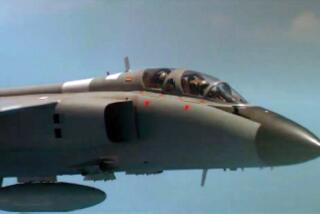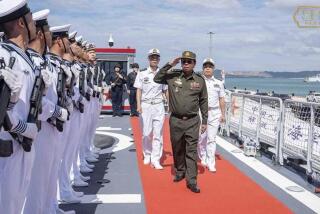U.S. moves closer to sale of frigates to Taiwan; Beijing protests
President Obama has signed a measure allowing the U.S. government to sell four used frigates to Taiwan, the Defense Ministry in Taipei said Friday. The news prompted an angry response from China, which considers Taiwan part of its territory and resents foreign efforts to boost the self-ruled island’s military.
The White House’s approval Thursday of the Naval Vessel Transfer Act, authorizing sales of the excess ships, gives Taiwan a shot at arranging its first purchase of American-made military equipment in three years. The Perry-class guided missile frigates would replace vessels that have been used for 20 years, analysts said.
But China’s Foreign Ministry said Friday that it had made a formal protest to Washington, a rebuke that could strain Sino-U.S. relations.
“We urge the American side to ... stop U.S.-Taiwan official contact and military exchanges, to stop arms sales to Taiwan and do more things that help overall Sino-U.S. relations and peaceful development of cross-Strait relations,” ministry spokesman Qin Gang said at a news conference in Beijing, referring to ties between mainland China and Taiwan.
Washington cut formal diplomatic relations with Taiwan when it reestablished such ties with Beijing in 1979. But the U.S. and Taiwan have maintained a strong “unofficial” relationship, including arms sales, for decades, which has irked China.
Taiwan has been separately ruled since 1949, when Chiang Kai-shek’s Nationalists fled to the island amid China’s civil war. But Communist Party leaders in Beijing claim sovereignty over the island of 23 million people, which sits 99 miles offshore, and bristle whenever Taiwan’s defenses get a boost from overseas.
China has more than 2 million troops and 520 ships, compared with Taiwan’s 290,000 active military personnel and 102 vessels, according to the statistical database GlobalFirepower.com.
Though relations between Beijing and Taipei have warmed since 2008, local elections in Taiwan last month indicated a surge in support for an opposition party that advocates more distance from China. Incumbent President Ma Ying-jeou and his Nationalist Party have eased historic tension through trade and investment deals.
A frigate sale is still uncertain. Washington and Taipei would need to set a price, possibly subject to legislative review in Taipei. The bill would probably top $50 million.
A 1979 act of Congress requires the United States to consider helping Taiwan defend itself but does not obligate it to sell particular hardware or keep a set schedule.
Washington last agreed to a military sale in 2011 with an upgrade to 146 U.S.-made F-16s, which Taiwan bought in the 1990s.
When the United States approved a $6.4-billion arms package for Taiwan in 2010, including Patriot air defense missiles and Black Hawk helicopters, China canceled military exchanges with Washington and said it would sanction American defense contractors involved in the deal.
Chinese officials are expected to cool down faster this time.
“They know these frigates are not threatening weapons,” said Raymond Wu, managing director of Taipei-based political risk consultancy e-telligence. “They pose no challenge to the PRC’s People’s Liberation Army.”
Jennings is a special correspondent.
More to Read
Start your day right
Sign up for Essential California for news, features and recommendations from the L.A. Times and beyond in your inbox six days a week.
You may occasionally receive promotional content from the Los Angeles Times.






